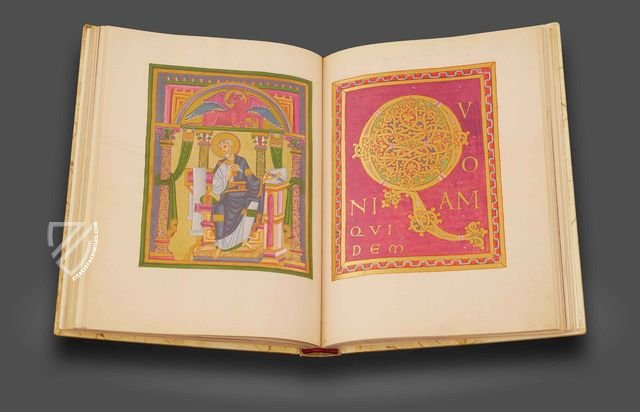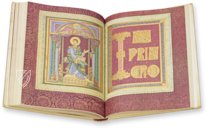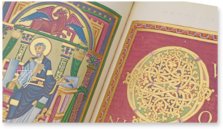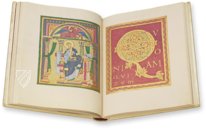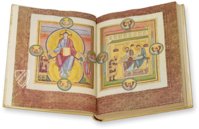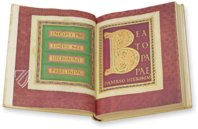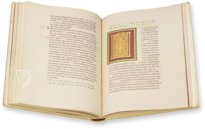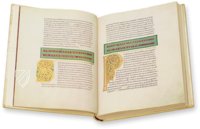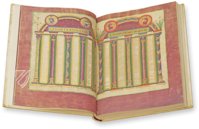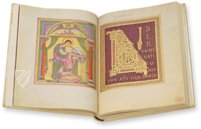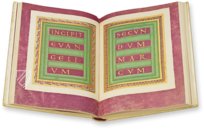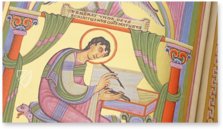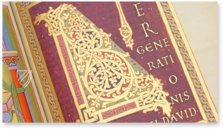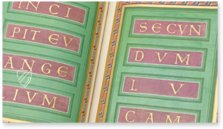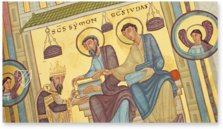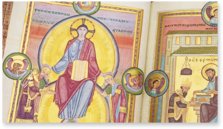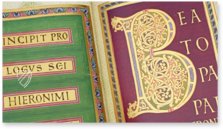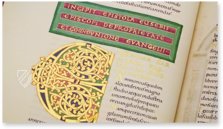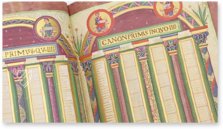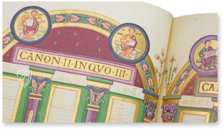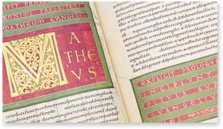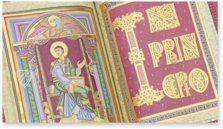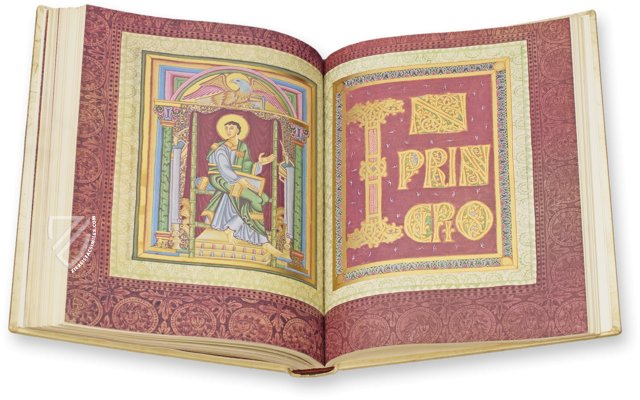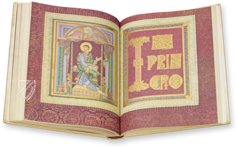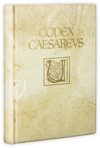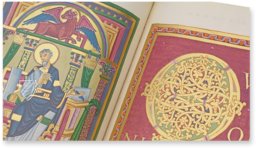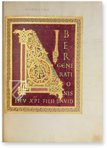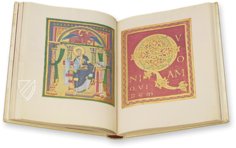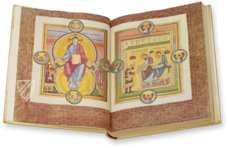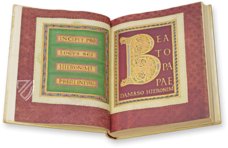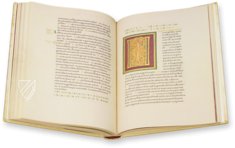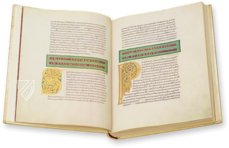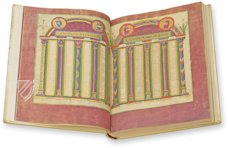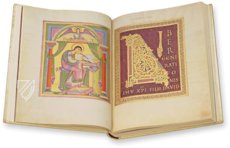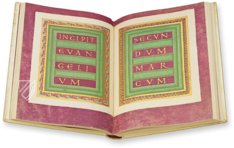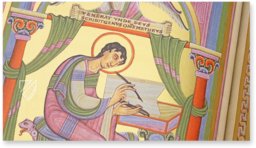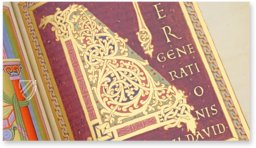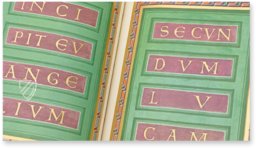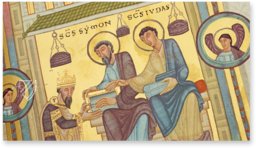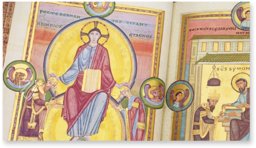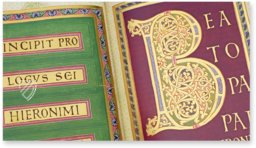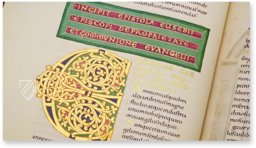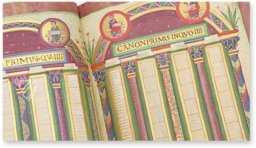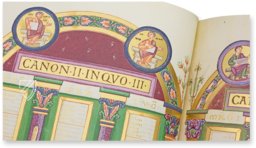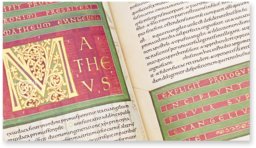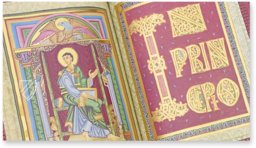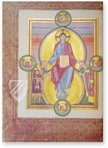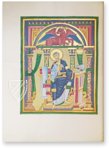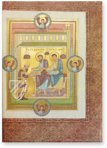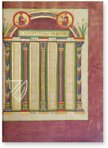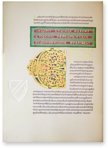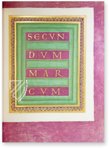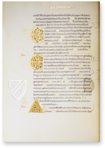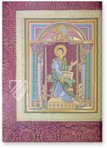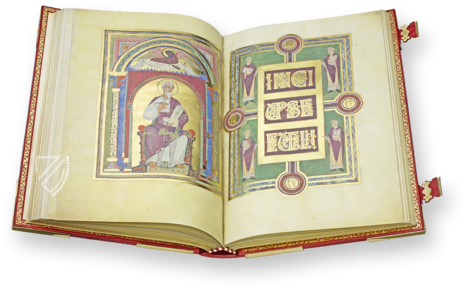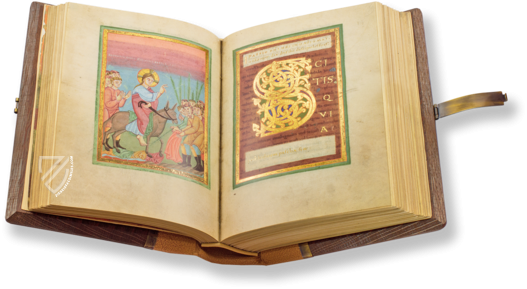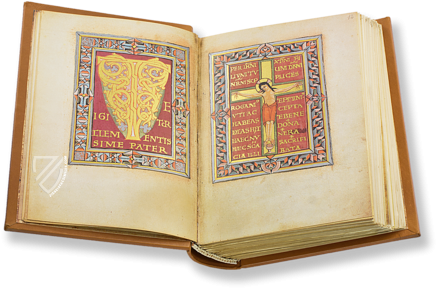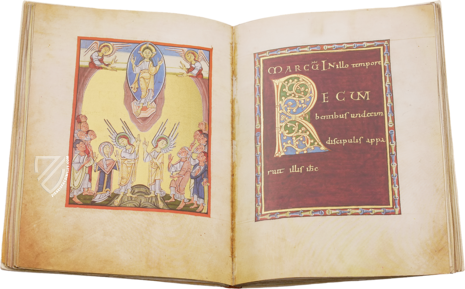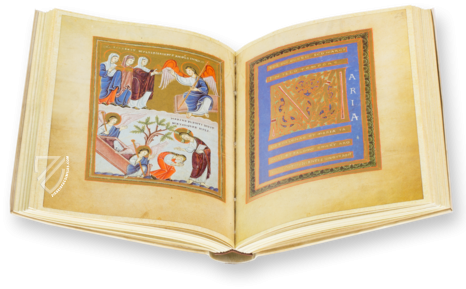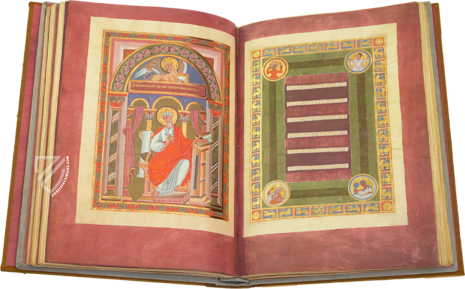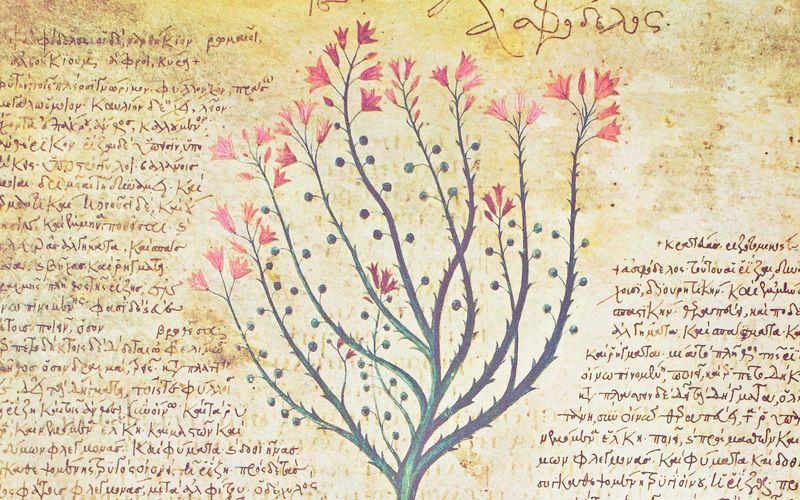Codex Caesareus Upsaliensis
(3,000€ - 7,000€)
The Codex Caesareus Upsaliensis is one of the most elaborate and valuable manuscripts commissioned by Ottonian emperors. The large-format magnificent codex was created around 1050 for Emperor Henry III (1016-1056), who donated it to the newly established Goslar Cathedral, as demonstrated by a splendid presentation miniature. Five further full-page miniatures present imposing portraits of the four Evangelists at the beginning of the gospels of the Evangeliary, as well as a remarkable coronation image of the Emperor and Empress Henry and Agnes (1025-77), who are given rulership by Christ. Numerous golden decorated initials, magnificent incipit pages and ornate canon tables complement the opulent illumination of the manuscript, which is decorated all over with purple and gold. This precious masterpiece was created in the famous scriptorium of Echternach Abbey, which produced lavishly illuminated codices for centuries that are some of the gems of all medieval art.
Codex Caesareus Upsaliensis
Although sometimes referred to as the Emperor’s Bible, the Codex Caesareus Upsaliensis is actually an 11th century Gospel book originating from the famous scriptorium of Echternach Abbey when that institution was at the peak of its manuscript production. It was commissioned ca. 1050 by the Emperor Henry III (1016-56) who then gifted it to Goslar Cathedral, an event which is depicted in a presentation miniature depicting the Emperor gifting the codex to Jude the Apostle and Simon the Zealot, who were the patron saints of the cathedral. On the opposite page, an additional miniature shows the coronation of Henry III and his wife Agnes of Poitou (1025-77) and both miniature pages are framed with a lovely textile pattern.
Décor Worthy of an Emperor
Aside from the two full-page miniatures at the beginning, each Gospel is preceded by a full-page Evangelist portrait. Five full-page initials also aid to introduce the commentary by Saint Jerome and each individual Gospel, in addition to two decorative incipit pages, respectively. Twelve gorgeous canon tables written in gold ink with vaulted arches, multicolored columns, and medallions with the Apostles and other figures. A single scribe appears to be responsible for the text, which was written by a masterly hand in Carolingian miniscule. Chapter headings and passages are preceded by decorative purple-green initials with gold leaf. The text ends with a series of pericopes and other short passages for specific holidays, indicating its ceremonial purpose.
A Missing Masterpiece
After being donated by the Emperor, the manuscript stayed in the treasury of Goslar Cathedral for more than five centuries, where it would have been used for ceremonial occasions and important holidays. The precious codex was lost in the course of the Thirty Years’ War (1618-48) when the Protestant city of Goslar was occupied by allied Swedish troops from 1632-34. However, the priests of the cathedral continued to practice Catholicism, and as such may have been the victim of plunder. Nonetheless, when it resurfaced more than 100 years later ca. 1740 it was in the possession of the Swedish diplomat, civil servant, and bibliophile Gustaf Celsing the Elder – and the luxury binding was gone. Upon the death of his son in 1805, the work was acquired by Uppsala University where it remains to this day.
Codicology
- Alternative Titles
- Evangeliary of Henry III
Evangeliar Heinrichs III.
The Emperor's Bible of Uppsala
Kaiserbibel - Size / Format
- 318 pages / 38.0 × 28.0 cm
- Origin
- Luxembourg
- Date
- Ca. 1050
- Style
- Language
- Script
- Carolingian Minuscule
- Illustrations
- 12 exceedingly splendid canon panels; 2 ornate carpet pages; 6 full-page miniatures richly decorated with gold; 6 full-page splendid initials on a gold background; 16 full-page and half-page text pages with gold background and uncounted gold initials
- Content
- Gospels
- Patron
- Emperor Henry III (1016–1056)
- Artist / School
- Master of St. Matthew
Master of the Mutineers
Echternach School - Previous Owners
- Gustaf Celsing
Gustaf junior and Ulrik Celsing
Codex Caesareus Upsaliensis
Patron Portrait of Henry III
Dressed in imperial purple trimmed with cloth of gold, Henry III is shown presenting the manuscript at hand to Saint Simon and Saint Jude, patron saints of the Goslar Cathedral, who are shown seated under a green tile roof. They are barefoot to emphasize their piety and are dressed in traditional Roman togas. The artwork is conspicuously Byzantine in style, especially with regard to the burnished gold background and the enlarged hands, which emphasize their gesturing.
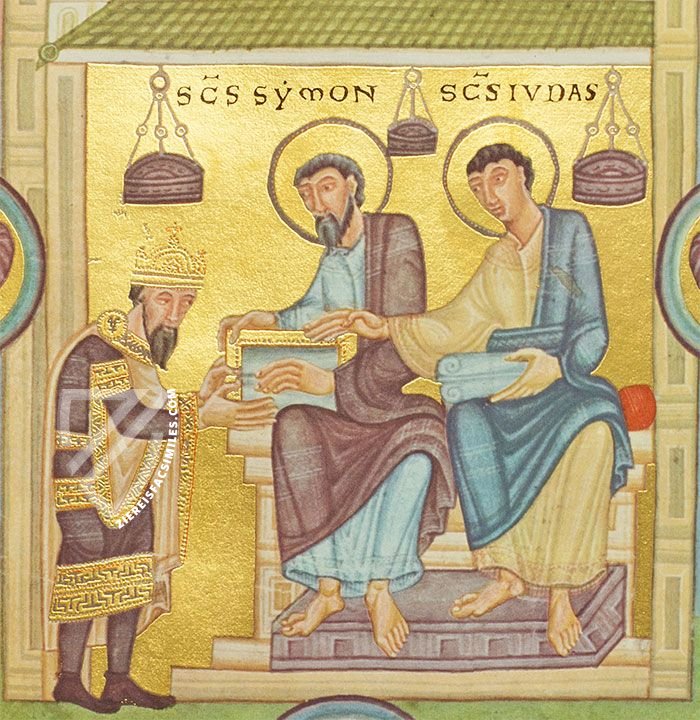
Codex Caesareus Upsaliensis
Coronation Miniature
Opposite of the donor portrait, Emperor Henry III and his wife Empress Agnes are shown being crowned by Christ, who sits in majesty and looks out from the page directly at the reader. Christ’s feet are shown resting on an orb with rings of various colors that represents the world and all of creation and he is presented before a spaceless and timeless gold leaf background.
The Emperor is depicted wearing golden spurs and holding a scepter with a bird on it, the Empress holds a scepter with a fleur-de-lis, both figures are dressed in purple robes trimmed with gold. The three figures are surrounded by the Evangelist Symbols, each presented in a medallion with a gold background. An intricate textile pattern frames the entire page.
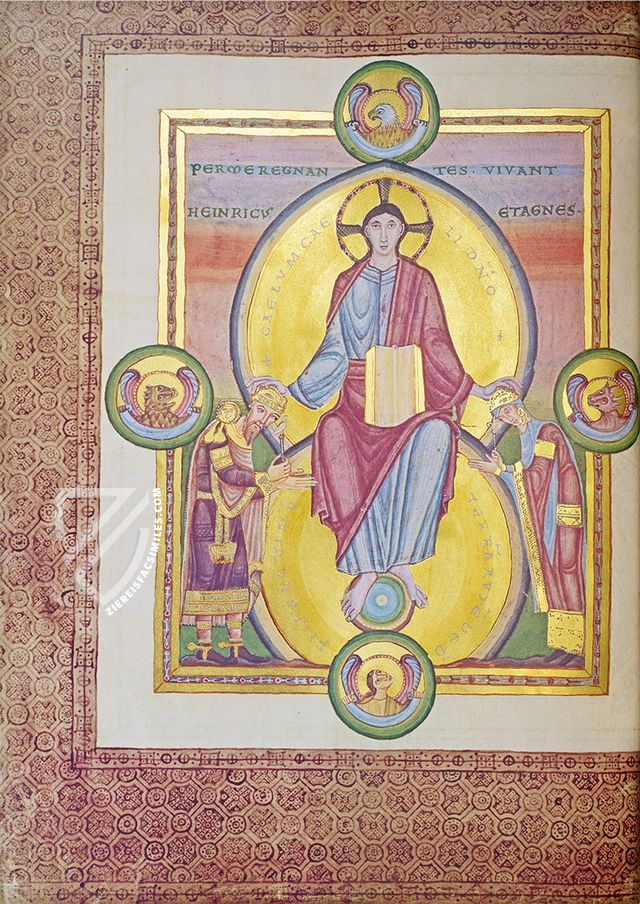
#1 Codex Caesareus Upsaliensis
Language: English
(3,000€ - 7,000€)
- Treatises / Secular Books
- Apocalypses / Beatus
- Astronomy / Astrology
- Bestiaries
- Bibles / Gospels
- Chronicles / History / Law
- Geography / Maps
- Saints' Lives
- Islam / Oriental
- Judaism / Hebrew
- Single Leaf Collections
- Leonardo da Vinci
- Literature / Poetry
- Liturgical Manuscripts
- Medicine / Botany / Alchemy
- Music
- Mythology / Prophecies
- Psalters
- Other Religious Books
- Games / Hunting
- Private Devotion Books
- Other Genres
- Afghanistan
- Armenia
- Austria
- Belgium
- Belize
- Bosnia and Herzegovina
- China
- Colombia
- Costa Rica
- Croatia
- Cyprus
- Czech Republic
- Denmark
- Egypt
- El Salvador
- Ethiopia
- France
- Germany
- Greece
- Guatemala
- Honduras
- Hungary
- India
- Iran
- Iraq
- Israel
- Italy
- Japan
- Jordan
- Kazakhstan
- Kyrgyzstan
- Lebanon
- Liechtenstein
- Luxembourg
- Mexico
- Morocco
- Netherlands
- Palestine
- Panama
- Peru
- Poland
- Portugal
- Romania
- Russia
- Serbia
- Spain
- Sri Lanka
- Sweden
- Switzerland
- Syria
- Tajikistan
- Turkey
- Turkmenistan
- Ukraine
- United Kingdom
- United States
- Uzbekistan
- Vatican City
- A. Oosthoek, van Holkema & Warendorf
- Aboca Museum
- Ajuntament de Valencia
- Akademie Verlag
- Akademische Druck- u. Verlagsanstalt (ADEVA)
- Aldo Ausilio Editore - Bottega d’Erasmo
- Alecto Historical Editions
- Alkuin Verlag
- Almqvist & Wiksell
- Amilcare Pizzi
- Andreas & Andreas Verlagsbuchhandlung
- Archa 90
- Archiv Verlag
- Archivi Edizioni
- Arnold Verlag
- ARS
- Ars Magna
- Art Market
- ArtCodex
- AyN Ediciones
- Azimuth Editions
- Badenia Verlag
- Bärenreiter-Verlag
- Belser Verlag
- Belser Verlag / WK Wertkontor
- Benziger Verlag
- Bernardinum Wydawnictwo
- BiblioGemma
- Biblioteca Apostolica Vaticana (Vaticanstadt, Vaticanstadt)
- Bibliotheca Palatina Faksimile Verlag
- Bibliotheca Rara
- Boydell & Brewer
- Bramante Edizioni
- Bredius Genootschap
- Brepols Publishers
- British Library
- C. Weckesser
- Caixa Catalunya
- Canesi
- CAPSA, Ars Scriptoria
- Caratzas Brothers, Publishers
- Carus Verlag
- Casamassima Libri
- Centrum Cartographie Verlag GmbH
- Chavane Verlag
- Christian Brandstätter Verlag
- Circulo Cientifico
- Club Bibliófilo Versol
- Club du Livre
- CM Editores
- Collegium Graphicum
- Collezione Apocrifa Da Vinci
- Comissão Nacional para as Comemorações dos Descobrimentos Portugueses
- Coron Verlag
- Corvina
- CTHS
- D. S. Brewer
- Damon
- De Agostini/UTET
- De Nederlandsche Boekhandel
- De Schutter
- Deuschle & Stemmle
- Deutscher Verlag für Kunstwissenschaft
- DIAMM
- Dropmore Press
- Droz
- E. Schreiber Graphische Kunstanstalten
- Ediciones Boreal
- Ediciones Grial
- Ediclube
- Edições Inapa
- Edilan
- Editalia
- Edition Deuschle
- Edition Georg Popp
- Edition Leipzig
- Edition Libri Illustri
- Editiones Reales Sitios S. L.
- Éditions de l'Oiseau Lyre
- Editions Medicina Rara
- Editorial Casariego
- Editorial Mintzoa
- Editrice Antenore
- Editrice Velar
- Edizioni Edison
- Egeria, S.L.
- Eikon Editores
- Electa
- Emery Walker Limited
- Enciclopèdia Catalana
- Eos-Verlag
- Ephesus Publishing
- Ernst Battenberg
- Eugrammia Press
- Extraordinary Editions
- Fackelverlag
- Facsimila Art & Edition
- Facsimile Editions Ltd.
- Facsimilia Art & Edition Ebert KG
- Faksimile Verlag
- Feuermann Verlag
- Folger Shakespeare Library
- Franco Cosimo Panini Editore
- Friedrich Wittig Verlag
- Fundación Hullera Vasco-Leonesa
- G. Braziller
- Gabriele Mazzotta Editore
- Gebr. Mann Verlag
- Gesellschaft für graphische Industrie
- Getty Research Institute
- Giovanni Domenico de Rossi
- Giunti Editore
- Graffiti
- Grafica European Center of Fine Arts
- Guido Pressler
- Guillermo Blazquez
- Gustav Kiepenheuer
- H. N. Abrams
- Harrassowitz
- Harvard University Press
- Helikon
- Hendrickson Publishers
- Henning Oppermann
- Herder Verlag
- Hes & De Graaf Publishers
- Hoepli
- Holbein-Verlag
- Houghton Library
- Hugo Schmidt Verlag
- Idion Verlag
- Il Bulino, edizioni d'arte
- ILte
- Imago
- Insel Verlag
- Insel-Verlag Anton Kippenberger
- Instituto de Estudios Altoaragoneses
- Instituto Nacional de Antropología e Historia
- Introligatornia Budnik Jerzy
- Istituto dell'Enciclopedia Italiana - Treccani
- Istituto Ellenico di Studi Bizantini e Postbizantini
- Istituto Geografico De Agostini
- Istituto Poligrafico e Zecca dello Stato
- Italarte Art Establishments
- Jan Thorbecke Verlag
- Johnson Reprint Corporation
- Johnson Reprint Corporation
- Josef Stocker
- Josef Stocker-Schmid
- Jugoslavija
- Karl W. Hiersemann
- Kasper Straube
- Kaydeda Ediciones
- Kindler Verlag / Coron Verlag
- Kodansha International Ltd.
- Konrad Kölbl Verlag
- Kurt Wolff Verlag
- La Liberia dello Stato
- La Linea Editrice
- La Meta Editore
- Lambert Schneider
- Landeskreditbank Baden-Württemberg
- Leo S. Olschki
- Les Incunables
- Liber Artis
- Library of Congress
- Libreria Musicale Italiana
- Lichtdruck
- Lito Immagine Editore
- Lumen Artis
- Lund Humphries
- M. Moleiro Editor
- Maison des Sciences de l'homme et de la société de Poitiers
- Manuscriptum
- Martinus Nijhoff
- Maruzen-Yushodo Co. Ltd.
- MASA
- Massada Publishers
- McGraw-Hill
- Metropolitan Museum of Art
- Militos
- Millennium Liber
- Müller & Schindler
- Nahar - Stavit
- Nahar and Steimatzky
- National Library of Wales
- Neri Pozza
- Nova Charta
- Oceanum Verlag
- Odeon
- Omnia Arte
- Orbis Mediaevalis
- Orbis Pictus
- Österreichische Staatsdruckerei
- Oxford University Press
- Pageant Books
- Parzellers Buchverlag
- Patrimonio Ediciones
- Pattloch Verlag
- PIAF
- Pieper Verlag
- Plon-Nourrit et cie
- Poligrafiche Bolis
- Presses Universitaires de Strasbourg
- Prestel Verlag
- Princeton University Press
- Prisma Verlag
- Priuli & Verlucca, editori
- Pro Sport Verlag
- Propyläen Verlag
- Pytheas Books
- Quaternio Verlag Luzern
- Reales Sitios
- Recht-Verlag
- Reichert Verlag
- Reichsdruckerei
- Reprint Verlag
- Riehn & Reusch
- Roberto Vattori Editore
- Rosenkilde and Bagger
- Roxburghe Club
- Salerno Editrice
- Saltellus Press
- Sandoz
- Sarajevo Svjetlost
- Schöck ArtPrint Kft.
- Schulsinger Brothers
- Scolar Press
- Scrinium
- Scripta Maneant
- Scriptorium
- Shazar
- Siloé, arte y bibliofilia
- SISMEL - Edizioni del Galluzzo
- Sociedad Mexicana de Antropología
- Société des Bibliophiles & Iconophiles de Belgique
- Soncin Publishing
- Sorli Ediciones
- Stainer and Bell
- Studer
- Styria Verlag
- Sumptibus Pragopress
- Szegedi Tudomànyegyetem
- Taberna Libraria
- Tarshish Books
- Taschen
- Tempus Libri
- Testimonio Compañía Editorial
- TGB Limited Editions
- Thames and Hudson
- The Clear Vue Publishing Partnership Limited
- The Facsimile Codex
- The Folio Society
- The Marquess of Normanby
- The Richard III and Yorkist History Trust
- Tip.Le.Co
- TouchArt
- TREC Publishing House
- TRI Publishing Co.
- Trident Editore
- Tuliba Collection
- Typis Regiae Officinae Polygraphicae
- Union Verlag Berlin
- Universidad de Granada
- Universitaire Bibliotheken Leiden
- University of California Press
- University of Chicago Press
- Urs Graf
- Vallecchi
- Van Wijnen
- VCH, Acta Humaniora
- VDI Verlag
- VEB Deutscher Verlag für Musik
- Verlag Anton Pustet / Andreas Verlag
- Verlag Bibliophile Drucke Josef Stocker
- Verlag der Münchner Drucke
- Verlag für Regionalgeschichte
- Verlag Styria
- Vicent Garcia Editores
- W. Turnowski Ltd.
- W. Turnowsky
- Waanders Printers
- Wiener Mechitharisten-Congregation (Wien, Österreich)
- Wissenschaftliche Buchgesellschaft
- Wissenschaftliche Verlagsgesellschaft
- Wydawnictwo Dolnoslaskie
- Xuntanza Editorial
- Zakład Narodowy
- Zollikofer AG

